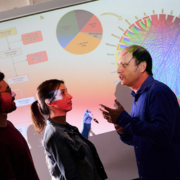TAU launches first ever study on cultured meat
TAU researcher launches world's first feasibility study on meat cultured in a lab
Concrete buildings, clean drinking water, and antibiotics are just a few of the "unnatural" benefits of modernity. Now cultured meat engineered in a laboratory, also known as in-vitro meat, may be poised to join this estimable list.
Tel Aviv University, together with the Modern Agricultural Foundation, has just launched a trailblazing feasibility study on cultured chicken breast production. The study will determine, among other things, how cultured meat, grown in a lab from animal stem cells, could be manufactured commercially, and examine the costs, technology, and potential problems involved. Prof. Amit Gefen of TAU's Department of Biomedical Engineering, one of the world's leading experts in tissue engineering, is leading the study on cultured meat production.
Cultured meat is produced by placing stem cells in a growth culture (fetal bovine serum, for example, is extracted from cow uteruses and rich with energy substrates, amino acids, and inorganic salts that support cell metabolism and growth). The cells divide and grow, creating solid pieces of meat.
There are many reasons to prefer cultured meat, researchers advise. First, the real thing isn't exactly "real" anymore. Animals raised for eventual slaughter are shot full of growth hormones and antibiotics, which are later ingested by people. Animal cruelty, which offends the values of many cultures, is another important reason, not to mention that health and safety regulations are often overlooked in factories.
But even if meat could be produced humanely, naturally, and safely, the world is fast approaching its production limit. By 2050, the world's population is projected to reach 9.2 billion, and meat production will need to be at least double what it is today, say experts.
This article was originally published by AFTAU.






